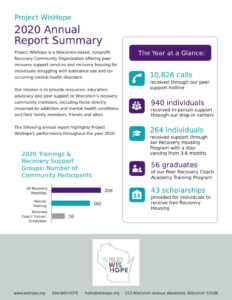Donate
Why Give to Project WisHope?
Nearly two-thirds of Wisconsin residents have friends or family members who have struggled with alcohol or other drug problems. In fact, it has been estimated that there are tens of thousands of Wisconsin residents living in recovery and even more who are currently struggling with substance use and co-occurring mental health disorders.
While enrolling in an addiction treatment program is an important step on the pathway to recovery, it is typically just the first of many steps a person must take if they want to establish and sustain a healthier, substance-free life. Learning to cope with the daily challenges of employment, stable housing, family and social relationships, and legal issues while building a full life in recovery is challenging.


This is Where Project WisHope Comes In
As a nonprofit Recovery Community Organization, Project WisHope provides evidence-based peer recovery support services to address the specific needs of individuals in recovery from substance use and co-occurring mental health disorders. These services center on the four dimensions of recovery: home, health, purpose and community; and work to build the protective factors and resilience that is needed for a lifetime journey of recovery.
Project WisHope’s peer recovery support services are peer-created and peer-led and aim to promote well-being in a number of ways, such as managing symptoms, achieving and maintaining abstinence, promoting harm reduction models, increasing access to housing and other community resources, reducing roadblocks to employment, and helping to secure other positive social support networks in the community.
Based in Waukesha, Wisconsin with strong ties to the greater Milwaukee area, our mission is to provide resources, education, advocacy and peer support to Wisconsin’s recovery community members, including those directly impacted by addiction and mental health conditions and their family members, friends and allies.
With your financial support, we can continue to support and inspire our recovery community members to become change agents within their communities, and we can increase capacity and access to our evidence-based peer recovery support services across the state.
Our Impact In Numbers
Since we opened our doors in 2016, Project WisHope has served thousands of individuals and provided an estimated $38,500,000 of savings in housing and recovery support costs in lieu of jail or prison and $343,777.5 in direct medical cost savings to Wisconsin’s recovery community members. Specifically, we have achieved the following:
Provided direct peer support services to 1,500 individuals
Enrolled 1,700 individuals in our Recovery Housing Program
Provided 160 scholarships for individuals to access free Recovery Housing
Produced 96 graduates of our Peer Recovery Coach Training
Project WisHope's performance in 2020:
10,826 calls received through our peer support hotline
940 individuals received in-person support through our drop-in centers
264 individuals received support through our Recovery Housing Program with a stay varying from 3-6 months
162 participants successfully completed our Narcan Training
208 individuals attended our All Recovery Support Meetings
56 graduates of our Peer Recovery Coach Academy Training Program
43 scholarships were provided for individuals to receive free Recovery Housing
Help us continue to do what we do best and are most passionate about: support our recovery community members. With your support, we can increase capacity and access to our evidence-based peer recovery support services statewide
Your Donations are Tax-Deductible
Any donation you can contribute to Project WisHope is greatly appreciated. You now may give online using our secure and convenient portal. Please note, RCNC is a 501(c)3 tax-exempt organization. Your donations are tax-deductible.
Donations contribute to the following recovery support services:
- Recovery Community Centers
- 24/7 Peer Recovery Resource Hotline
- Peer Recovery Coaching Services and Trainings
- Recovery Housing Scholarships
- Recovery Support Groups
- Peer Support Groups
- Family Support
- Community & provider education

